#Shukshin
Text
Elena Simonova, Vasily Shukshin. Far Away… VTO Literary-Dramatic Theatre, Moscow, 1977

Scanned from the book "The Soviet Art Poster", Penguin Books.
3 notes
·
View notes
Photo






Kalina Krasnaya (The Red Snowball Tree) , Vasiliy Shukshin , 1974.
33 notes
·
View notes
Text
Map Of America At The Height Of The Second American Civil War And Toppat Activities In The Territories
(Decided to do some mapping again after a long time (former mapper in Reddit), this is based on the Hearts of Iron 4 mods (Kaiserreich and TNO: Last Days of Europe) and takes place in @crown-of-roses-thsc 's THSC universe mixed with some TNO characteristics)
"The Divided States of America"
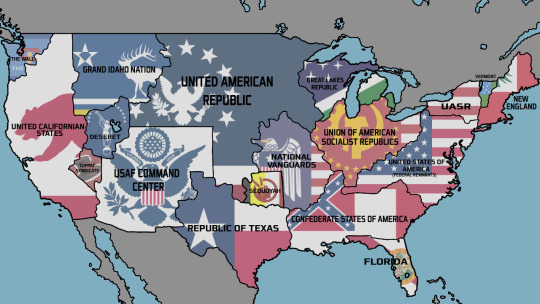
Lore: In the turn of the 21st Century, the Germans have abandoned the ways of Nazism in favor of democracy after the cabinet loyal to the old and bigoted ways was overthrowned by a democratic opposition group with help from the US, Russia and her allies, finally restoring peace and harmony after years of being under the fascist boot. In Russia, after having unified the Motherland under the democratic banner of Shukshin have successfully reclaimed their western territories and the sacred capital of Moscow from the Germans, going so far as to reach all the way to Germania (Berlin) and humbling their ideas of being the master race with help from their allies and the Organisation of Free Nations. In Italy, although elements of fascism remained within the Italian Empire have managed to liberalise and relax their ideals, allowing democracy and prosperity to continue functioning as it is to preserve their empire and their colonies. In Japan, after years of claiming the title of "Hegemon of Asia" has finally been humbled by a coalition of Russians, Americans, Chinese, Filipinos, Indonesians, and other oppressed groups and within the Japanese Empire and allies, forcing themselves to give up most of their lands and submit to a joint CSTO-OFN occupation. Establishing a reformed constitutional monarchy with democratic characteristics. In West Africa, after coming on top, the French Military Alliance have re-established French rule over West Africa in preparation for their liberation of the French homeland from the Germans. After their inevitable defeat, the newly restored France aimed to democratise West Africa and relax their grasp over their Francophile native allies in West Africa. The world seemed to be on it's path to a democratic and bright future.
In the US, after strings of authoritarian and progressive presidents have managed to stay intact and lead the free world to a bright future. However, despite the light of the future shining a dark shadow of misfortunes would dampen the light as certain issues oppositions of the presidencies have not yet been addressed. Adding to the burden are the efforts of those opposition groups and politicians to remain prevalent, even resorting to ruffled the government with scandals and misdemeanors. All would be good until a certain group called the Toppats have emerged in the 2000s, wreaking havoc across the US and some parts of the globe through criminal activities from stealing artifacts to partaking in minor terrorism. Efforts have been made by the US military and OFN-CSTO troops to contain the group and to bring justice to the criminals. However, they would prove to be difficult in handling but they would be mostly idle for some time which did not concern the government, until during one event in Washington DC the Toppats under Terrence Suave had successfully assassinated the US President at the time along with some of his cabinet members through their airship and proceeded to raid the capital. After some time the airship was forced to flee after the US military pushed them back to international airspace. The aftermath of the assassination would be everlasting as not only another president was assassinated during office, but was done in the very capital of America with such technology. Seeing the opportunity, opposition, seperatist, and other non-affiliated groups rose up and declared their legitimacies to the "true" US, depose the weakened federal government, or separate from the decaying body of the United States. It is now the present, and the United States has be dragged into another civil war, adding to the burden of the Toppats who have taken over Las Vegas during the chaos and used as their new HQ to raid the territories of the United States. Allies in the OFN and CSTO have occupied the overseas American territories such as Russia occupying Alaska and establishing a military government and Italy being trusted with administrating the Panama Canal along with other OFN members to prevent the lands from suffering the chaos the mainland is currently facing. The questions for now are who will succeed the United States, will the US comeback or become a footnote in history and who will be the one who will deal with the Toppats once and for all.
"The Onslaught Of The Toppats"
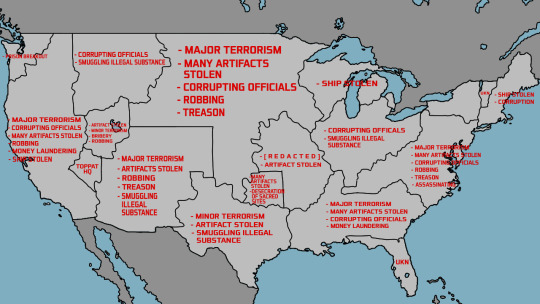
Lore of the Toppats: Since the start of the 2nd American Civil War, Terrence Suave, Chief of the Toppats have claimed responsibility for the raid in Washington DC and the death of the US President as a form of boast to those in the government and to the other factions about the wrath of the Toppats and his. As Las Vegas was contested territory and left to succumb to anarchy, Terrence led the Toppats to Las Vegas and claimed it for the clan. With the riches of Las Vegas under his grasp, he would loot the city and repurpose the businesses, luxury resorts, and casinos to generate income for the Toppats, although some claim that the services were either excellent or terrible and the staff were abused (despite most of them being Toppat themselves). Even when having Las Vegas under his grasp, the Chief of the Toppats is still not satisfied with the riches and luxury, so he formed a system where small to large dispatches of Toppats would be assigned to a certain territory and are given certain assignments such as stealing a valued artifact, corrupting the bureaucracy of the local government, smuggle weapons and illegal substances, and steal certain ships. Even factions the belong to the government have declared the Toppats as a terrorist group and Terrence as an enemy of the state. While the onslaught continues and his rule over Las Vegas tightened, he would slowly not feel himself and would become a tyrant who purges his fellow clan members in the same vain as Joseph Stalin and the Great Purge. This would go on until Ellie Rose and a group of rebel Toppats will overthrow Terrence as Chief and have Las Vegas be besieged by General Douglas Stickmin (Father of Henry Stickmin) of the USAF Central Command.
(Idk why I did all of this, I was bored and inspired by my current gameplay in Hearts of Iron IV. Check out the TNO lore for more context of the other half of my thingy)
#the henry stickmin collection#thsc#henry stickmin collection#thsc au#hoi4#hoi4 mods#kaiserreich#crown of roses thsc#toppat clan
16 notes
·
View notes
Photo
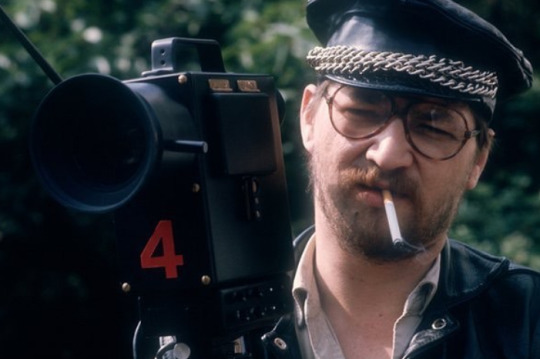
Rainer Werner Fassbinder’s Favorite Movies:
1. The Damned (1969, dir. Luchino Visconti)
2. The Naked and the Dead 1958, dir. Raoul Walsh
3. Lola Montès (1955, dir. Max Ophüls)
4. Flamingo Road (1949, dir. Michael Curtiz)
5. Salò, or the 120 Days of Sodom 1975, dir. Pasolini
6. Gentlemen Prefer Blondes (1953, dir. Howard Hawks)
7. Agent X27 (1931, dir. Josef von Sternberg)
8. The Night of the Hunter (1955, dir. Charles Laughton)
9. Johnny Guitar (1954, dir. Nicholas Ray)
10. The Red Snowball Tree (1974, dir. Vasiliy Shukshin)
18 notes
·
View notes
Text
On March 18, Russia’s Central Election Commission (CEC) announced that Vladimir Putin would remain in power for a fifth presidential term, following a landslide “election” win. According to the CEC’s preliminary data, Putin received a record-breaking 87.28 percent of the vote with an equally record-breaking voter turnout of 77.44 percent. Surprisingly, the CEC continues to publish data on individual polling stations, making it possible to piece together how the authorities manufactured these unprecedented results. Peculiarities in the vote count itself paint a clear picture of what appears to be the most fraudulent election in Russia’s modern history. Meduza examines the evidence.
All current analyses of Russia’s voting results, both here and in other publications, are based on data from the Russian Central Election Commission’s (CEC) website that were collected and made publicly available by programmer and electoral analyst Ivan Shukshin. The data cover 98 percent of polling stations, including those from Russian-annexed Crimea but excluding those from other occupied areas of Ukraine. Ivan Shukshin’s own analysis of the election results can be found here.
What’s the evidence?
Some of the statistical anomalies in the data show clear evidence of falsifications since they can’t be explained by anything else. Others appear highly suspicious but could theoretically have other causes. In other words, anomalies come in different forms and should be examined individually.
The two main anomalies prevalent in almost all recent Russian elections are a correlation between the ruling party candidate’s results and the turnout, and spikes at round values for both voter turnout and election results. This time, the magnitude of both anomalies has reached unprecedented levels.
More ‘turnout,’ more Putin
Leading independent election analyst Sergey Shpilkin has been studying the distribution of votes and voter turnout in Russian elections since the early 2010s and has come up with a method for distinguishing between legitimate votes and falsified ballots. According to Shpilkin’s logic, since the exact number of voters who come to a given polling station and the number of votes they cast for different candidates hinge on numerous random factors, the overall spread of voter turnout and candidate results across polling stations should be characteristic of random processes and fall along a normal, bell-shaped curve. On a scatter plot of these two variables, the polling stations should appear as a single, symmetrical spot. Any deviations from this distribution would be considered anomalous and require a separate explanation. These kinds of deviations have been observed in Russian elections since at least 2004.
The most obvious explanations are either physical ballot stuffing or falsified voting records. This type of fraud simultaneously increases voter turnout numbers and the final percentage of votes for the ruling party’s candidate. Polling stations engaged in this fraud fall to the right of a normal distribution: on a scatter plot showing the relationship between voter turnout and votes for the state’s candidate, they appear as a tail extending to the upper right corner.
This is what such a scatter plot from the 2018 Russian presidential elections looks like:
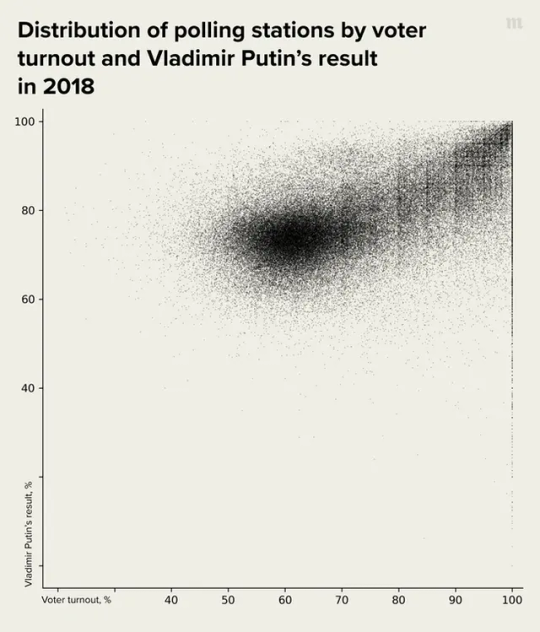
Already, the tail is large enough to have a significant effect on the overall results, even just based on the sheer number of polling stations with anomalous figures.
Here’s what the same distribution looks like for the 2024 “elections”:
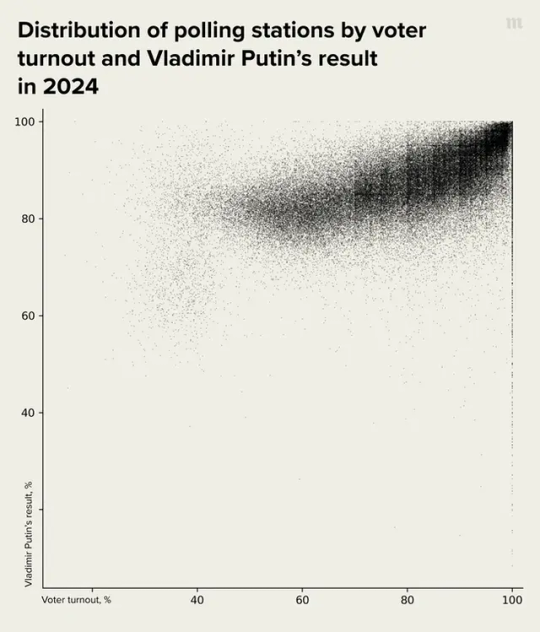
The central core of typical polling stations has vanished in the latest election: other than a very faint spot at around 40 percent voter turnout, only anomalous polling stations are left. Looking at the regional breakdown, this barely visible cluster is almost entirely made up of Moscow polling stations. However, even this breaks down further into two discrete clusters with centers at around 65 percent and 85 percent. This could be explained away if there were essentially “two Moscows” with fundamentally different levels of support for Putin, but no such picture emerged in any previous election. Another explanation is the influence of mass remote electronic voting on individual polling stations, which raises the percentage of votes for Putin. The same pattern could show up if votes from one candidate were reallocated to another without ballot stuffing (or the corresponding change in “turnout” numbers).

In St. Petersburg, the picture is fundamentally different. Here, there aren’t any clusters of polling stations with average turnout: there’s basically just the tail (as well as unnatural jumps in results between regions, a clear indicator that the results were fabricated). Annexed Crimea and Sevastopol show a similar, but even more pronounced picture.
The anomalous vote distribution, which has lost any resemblance to a bell curve, could perhaps be explained away by the heterogeneity of Russian regions. Both support for the government and voter turnout could differ widely due to a variety of local factors. If this were the case, the distribution wouldn’t show up as a bell curve, even without electoral fraud.
This might make for a strong objection if it weren’t for one thing: Russia has been holding elections for years, but only now, in 2024, has the normal distribution pattern completely disappeared. The graph below shows the distribution of votes for all presidential elections in Russia starting from 2000. One can clearly see that what used to be a deviation has become the norm, and the norm has completely disappeared.

Convenient counting
The second most significant anomaly in both these and previous elections is something often referred to as “Churov’s saw”: peaks at round values for both voter turnout and results. Unlike the correlation between the result and turnout, the causes of which can be debated, this anomaly can’t be explained by anything other than manipulating the numbers to achieve the desired outcome.
While there’s some small background amount where peaks can occur in distributions for purely mathematical reasons (for example, due to the finite number of registered voters at a given polling station), this is easy to account for using statistical methods.
In the past, researchers Dmitry Kobak, Sergey Shpilkin, and Maxim Pshenichnikov have statistically verified the presence of peaks at round values that, generally speaking, are visible even to the naked eye. These peaks first appeared in Russia’s 2004 elections and have only become more pronounced since.
To quantify how much worse the situation’s become, we analyzed the 2024 data collected by Ivan Shukshin using the same methods. The graphs below show the distribution of polling stations by turnout and by Putin’s percentage of the vote for both 2024 and the previous presidential election, in 2018.

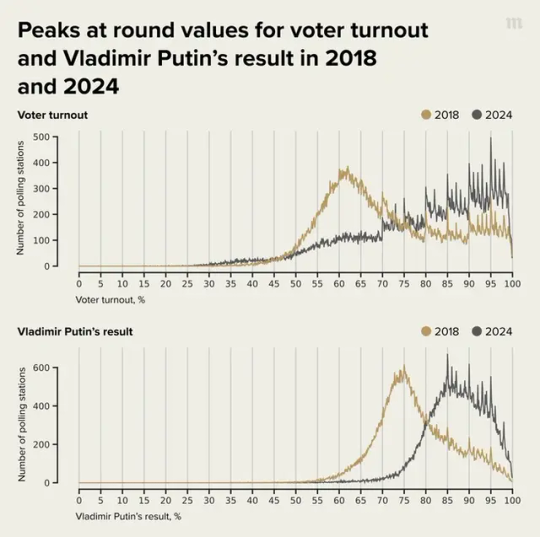
It’s clear that the situation with record manipulation hasn’t simply worsened but fundamentally changed: there’s no longer a dominant majority of polling stations with normal turnout and a minority with visibly falsified data. Now, the latter constitute the majority, and it’s impossible to isolate any normal average turnout from the distribution. In other words, the distribution has completely lost any semblance of normality.
When comparing the 2018 and 2024 presidential elections, it’s important to remember that the level of fraud in 2018 was already so extensive that the results should have been invalidated, even according to Russian laws. In light of this, it’s useful to compare the current situation to when Vladimir Putin was first elected president in 2000 (the last Russian presidential elections without peaks of manipulated numbers). Here, it’s clear that arguments suggesting Russia is too unique of a country to fit expected voter turnout patterns don’t hold up to criticism. The country in the two graphs hasn’t changed — the guidelines for vote counting have.

Even when compared to 2018, the level of record manipulation in 2024 is staggering. In an article on the 2018 Russian presidential election, Kobak, Shpilkin, and Pshenichnikov published a graph showing how the number of polling stations with manipulated records grew over time. When adding in new data from 2024, it appears that the number of polling stations manipulating records has almost doubled since 2018.
Where’s the truth?
Using Sergey Shpilkin’s methodology, Ivan Shukshin estimated that electoral commissions gave Vladimir Putin around 22 million extra votes, mainly through voting record manipulation rather than physical ballot stuffing or “carousel voting.” But Shukshin’s approach requires a core of normal data from which deviations can be extrapolated, and in the 2024 Russian presidential elections, there was no identifiable norm. Indeed, using the same data, Novaya Gazeta Europe calculated a surplus of 31.6 million votes for Putin. This discrepancy can be explained by the fact that Shukshin and Novaya Gazeta Europe drew on different vote clusters to represent what they used in their calculations as “normal.”
In reality, neither estimate can be said to accurately represent the current situation. As can be seen in the graphs above, there’s no longer a cluster of normal polling stations in Russia from which the true average percentage of votes cast for candidates can be calculated. Shpilkin’s method has its limitations: it only takes into account inflated numbers at polling stations, not other types of fraud, and it only works when anomalies don’t become the majority. With the current level of reliably documented fraud, there’s no normal majority anymore — the method simply has nothing to rely on.
However, even though the exact number of stolen votes remains unknown, Russia’s 2024 presidential election was almost certainly the most fraudulent in the nation’s history. Moreover, the sheer magnitude of fraud eclipses that of 2018, when the extent was already such that the results should have been legally nullified, according to Russia’s own laws.
2 notes
·
View notes
Text
(not)Very interesting posts.
This is an experimental column where the authors detail facts about characters on certain topics. This text is also translated from Russian. Enjoy.
So, what books do the heroes read?
Thylla characters:
Well, Dav, of course, doesn’t read books, because it’s difficult to keep his attention and not give up at the very beginning. Surely there were a couple of times when he tried to read something, and probably it could have been science fiction or some kind of action movie about epic men, but it’s unlikely that he ever finished reading a book to the end.
Mar doesn’t read much, and if she does read, it’s something short or listens to audiobooks, but for her it’s boring. I think she likes detective and all kinds of crime. Style-wise, she probably likes King.
Glor liked to read all sorts of novels as a teenager, but now she reads less. I probably like psychology (as a genre) and in general anything that you can think about.
Apfel characters:
Volya: In general, he somehow doesn’t read and used to read only what was asked at school, but if he still really fell in love with reading and preferred to abstract himself from life with the help of them, rather than walking around garages with Dev, then he would He probably loved fairy tales. Well, it’s clear that they’re not too childish, but at least, I don’t know, “Carlson”, Kipling, Mark Twain maybe, “The Little Prince” at the very least. In general, probably also lyrics, some dramas in verse, poems. Perhaps predominantly German, like Schiller, Goethe, all that. Well, or Lermontov there, Pushkin. If we talk about prose that is even more serious than fairy tales, then it is definitely either something kind and good, like dandelion wine, or something that you can lament and cry over. He definitely liked “Mu-mu”, “Yushka”, maybe Gorky. I haven’t read much of this kind of literature myself. Turgenev may still be there in general, but I’m not sure.
Dmitry: Of course, Soviet classics. Everything about the war (“How the Steel Was Tempered”, “Brawler”, “Dawn over Kiev”), and all sorts of Sholokhov, Simonov, Shukshin. There is nothing more to say, everything is clear here.

1 note
·
View note
Text
gus hall tno is a good thought exercise. his ideas about needing to reform america's entire system and society are very correct and right on the nail. in fact, most of his policies are great. however the way he sets about achieving those goals is terribly headstrong and not a good idea. idealism is all well and good but we must be capable of realising that a fundamental problem of full socialism is that abolishing a market economy requires either full autarky or the entire world being socialist, which are both rather impractical in hall's context. pragmatism needs to triumph to an extent, but don't be like petlin. moderation. hall is so determined and convicted that he tunnel visions on achieving his objective and fails to see the potential consequences in the volatile situation. he's the type of leftist who wants to guillotine everyone, and thats bad enough as is but the fucking nazis are literally right there. even in 2wrw shukshin wont come knocking until a few years later. the best case scenario is of course long yun and shukshin enjoying total victories, but even still. not a good move, gus
1 note
·
View note
Text

Autumn Sale at Shakespeare & Friends Bookshop at 28 Dragoman St. in Varna from 1:00 – 4:00 on Saturday, October 1st.
For the best prices in town browse the sale to find books in all genres and all languages to get set up for the coming winter months. In English many bestsellers such as A Clockwork Orange by Anthony Burgess and Forty Rules of Love by Elif Shafak (one of my top 5 favorites), along with 1 leva, 2 lev and 5 lev boxes in general fiction, crime/thriller and young adult. To get a taste of crime/thrillers writers such as James Patterson, Clive Cussler, Tom Clancy, Robert Ludlum, John Grisham and Lee Child, all are all priced 2 lev. Genres in English include history, biographies, cooking, health, general fiction, SciFi/Fantasy and young readers. Want to learn about yoga, reflexology or Tai Chi, come to the sale.
Books in Bulgarian by foreign writers include: Lauren Kale, Charles Bukowski - Absence of the Hero, Ernest Hemingway, Jack London, George Orwell - 1984, Jaroslav Hasek, to name a few. Terry Pratchett - The Color of Magic and Hogeater, William Golding – Lord of the Flies, Victor Hugo – Poems, The King is having Fun, Notre Dame of Paris, A.J. Cronin – The Citadel, Aldous Huxley- Point Counter Point, Kurt Vonnegut – Cat’s cradle and Breakfast of Champions.
Books in Bulgarian by classic Russian writers include Vladimir Nabokov Lolita, A.C. Pushkin, Boris Pasternak Dr. Zhivago, Dostoevsky and Lev Tolstoy.
Classic Bulgaria writers in Bulgarian include Yordan Yovkov, Dimitar Dimov - Tobacco, Ian Vazov, and Hristo Botev.
Books in Russian by Russian writers include Ecenin, Shukshin, Pushkin, Shiskon, and Dostoevsky
See you and bring your money or your life!
0 notes
Text

Visitors shoes at the entrance. V. Shukshin's home and museum 1970s
151 notes
·
View notes
Photo






Red viburnum
This picture was created during my studies at the Academy of Fine Arts, when I was on the 4th year of study.
the main idea of this still life is in direct reference to the story by Vasily Shukshin "Kalina Krasnaya". In 1974 Shukshin became the director of the film by the story which he wrote. He also played the main role of Egor: the thief who had just been released from prison.
Egor wrote letters to a woman from a Russian village during his imprisonment. He wants to start a new life with her, although he hasn’t seen her even once.
The only thing that unites them is their letters. Each of them had a difficult fate, each of them just wanted to be happy.
This picture is first of all the story. Key signs such as crumpled paper (prisoners' letters), the leather black jacket (an image of a prisoner), the blood red
berry (a symbol of the tragedy of the fate of the hero, his sacrifice and retribution for his sins).
These are thoughts about whether bad person have a second chance or not. Can we forgive others and ourselves for mistakes if we regret.
And in conclusion, I want to say :
how difficult to say goodbye to the past. Sometimes the past does not want to let go.Perhaps Shukshin did not give people a second chance (I made this conclusion from the last scene of the film), but in my story, people always have a chance to start all over again.
#artist#artwork#art#fineart#painting#painter#spb#spbart#art job#shukshin#literature#cinema#movie#kalina#red#berry#viburnum#details#facture#oil#oiloncanvas#canvas art#canvas#masterpeace#oilpaint#homedecor#still life#art academy#study#studywork
4 notes
·
View notes
Photo









ветка сирени упала на грудь, милая груша, меня не забудь.
24 notes
·
View notes
Photo


Dva Fëdora (Marlen Khutsiyev, 1958)
#Два Фёдора#dva fëdora#dva fyodora#marlen khutsiyev#marlen khustiev#vasiliy shukshin#the two fyodors#soviet cinema#soviet film#soviet movie#russian cinema#russian film#russian movie#1958
12 notes
·
View notes
Photo

“Не старость сама по себе уважается, а прожитая жизнь. Если она была.“
В.М.Шукшин
24 notes
·
View notes
Photo




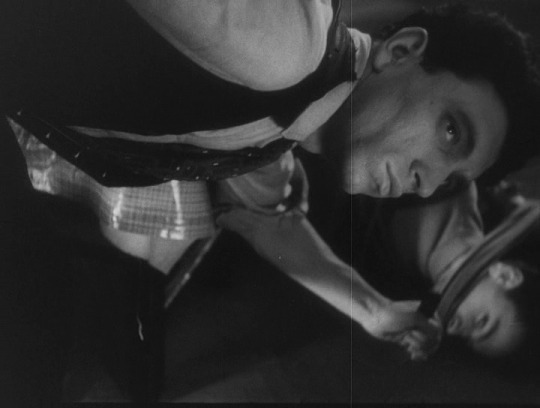
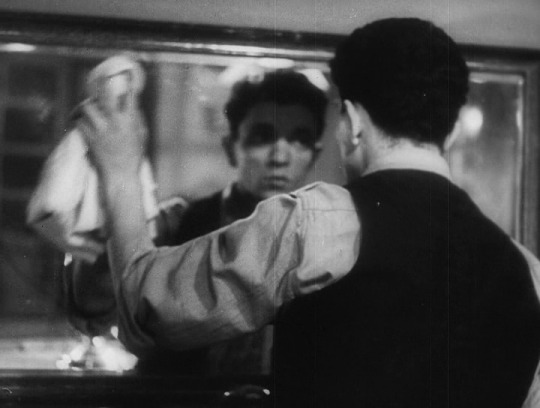
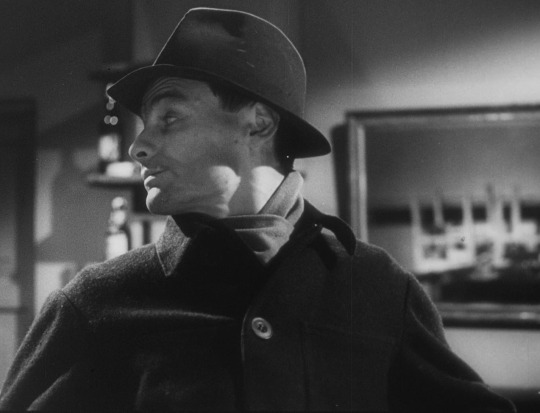



The Killers (Andrei Tarkovsky, Aleksandr Gordon & Marika Beiku, 1956)
#The Killers#Andrei Tarkovsky#Aleksandr Gordon#Marika Beiku#Ubiytsy#film noir#short film#black and white#hands#guns#smoke#1956#Yuli Fait#Valentin Vinogradov#Vadim Novikov#Yuri Dubrovin#Vasili Shukshin#Ernest Hemingway#intrigue
291 notes
·
View notes
Photo










Печки-лавочки (1972) реж. Василий Шукшин
#Печки-лавочки#Василий Шукшин#Лидия Федосеева-Шукшина#Людмила Зайцева#Vasily Shukshin#Shukshin#70s#1970s#russian cinema#soviet cinema#ussr#мадэ ин юса!#screencaps*
16 notes
·
View notes
Quote
On Sundays a particular kind of anguish would suddenly attack. The kind that eats away at you, somewhere deep inside . . .
Vasily Shukshin (1929 - 1974), from “I Believe !”, translated from the Russian by Valentina Brougher and Frank Miller with Mark Lipovetsky
in: “50 Writers: an anthology of 20th century Russian short stories”
“По воскресеньям наваливалась особенная тоска. Какая-то нутряная, едкая...”
#Vasily Shukshin#Russian literature#Russian writer#literature#quotes#Василий Шукшин#литература#русская литература#русский писатель
35 notes
·
View notes